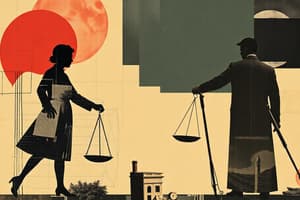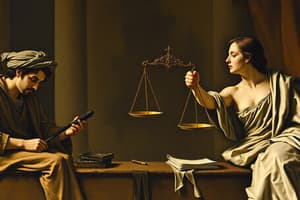Podcast
Questions and Answers
The original position allows individuals to know their wealth, health, and social status when deciding principles for society.
The original position allows individuals to know their wealth, health, and social status when deciding principles for society.
False (B)
Under the veil of ignorance, individuals make decisions based on their own societal advantages and disadvantages.
Under the veil of ignorance, individuals make decisions based on their own societal advantages and disadvantages.
False (B)
Rawls' first principle of justice guarantees equal basic liberties for all individuals.
Rawls' first principle of justice guarantees equal basic liberties for all individuals.
True (A)
The second principle of justice allows for social and economic inequalities if they do not benefit the least advantaged members of society.
The second principle of justice allows for social and economic inequalities if they do not benefit the least advantaged members of society.
Individuals in the original position would choose principles of justice to ensure fairness and equality in society.
Individuals in the original position would choose principles of justice to ensure fairness and equality in society.
Flashcards
Original Position
Original Position
A hypothetical situation where people choose principles for organizing society without knowing their personal details (wealth, health, etc.).
Veil of Ignorance
Veil of Ignorance
The condition in the original position where individuals are unaware of their personal circumstances.
First Principle of Justice
First Principle of Justice
Guarantees equal basic liberties for all, preventing bias with a universal approach.
Second Principle of Justice
Second Principle of Justice
Signup and view all the flashcards
Rawls' Theory of Justice
Rawls' Theory of Justice
Signup and view all the flashcards
Study Notes
Rawls' Theory of Justice
-
Original Position: A hypothetical situation where individuals select principles to organize society.
-
People in the original position: Rational and self-interested individuals.
-
What they do not know: Their social status, wealth, abilities, or personal characteristics. This is known as the "veil of ignorance."
-
Why they don't know: To ensure impartiality and avoid bias towards their own specific circumstances.
Two Principles of Justice
-
First Principle: Guarantees equal basic liberties for all citizens, like freedom of speech and voting.
-
Reason for choosing this principle: Everyone would want to protect their fundamental freedoms, regardless of their specific situation.
-
Second Principle: Allows social and economic inequalities, but only if they benefit the least advantaged members of society.
-
Reason for choosing this part: Parties in the original position, not knowing their future position, would want to ensure that inequalities do not harm the lowest members in society.
Studying That Suits You
Use AI to generate personalized quizzes and flashcards to suit your learning preferences.




